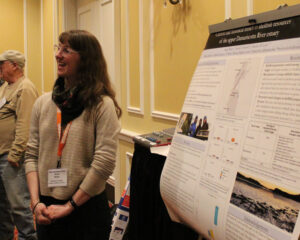Sarah Risley: Seeking solutions to strengthen coastal economies
This master’s student in marine science and policy is working with coastal communities to help assess their shellfish resources
 What problem/s are you working to solve?
What problem/s are you working to solve?
Our team is working on a collaborative project with the Bremen and the Damariscotta-Newcastle Shellfish Committees to assess shellfish populations in the Damariscotta River Estuary and the Medomak River Estuary. Harvesters in both estuaries have requested studies to understand current and historical shellfish abundance and distribution, as well as human use patterns in the river, to help inform management and planning decisions. Overall, the project investigates how two midcoast Maine estuaries and the shellfisheries that depend on them have changed over time and identifies possible options for future stewardship and co-management by the harvesters, towns and state.
What progress are you making toward solutions?
In light of the COVID-19 pandemic, our team has been working hard to redesign our project so that our research efforts can safely continue during the crisis. Currently, we are developing a participatory mapping survey to gather local knowledge from harvesters and other experts and to document shellfish abundance and human use patterns in the estuary. This mail survey will be supported by semi-structured debriefing interviews with participants to further understand perspectives on how and why changes are taking place. We are in the process of designing the survey and plan to implement the research this summer (2020). The maps that our team develops will serve as a guiding tool for further biological inquiry by identifying ‘hotspot’ areas of historical or current significance for use by shellfisheries. The maps will help bring multiple groups together, either in a shared virtual or physical space, to spark discussions of use patterns and change in the estuaries. It is our hope that this project will contribute to municipal shellfish management and generate information on how the estuary and the fisheries that are part of it are changing.
How could your findings contribute to a sustainable future in Maine and beyond?
The knowledge generated through this project will deepen our understanding of the current and historical use and values associated with these two estuaries in midcoast Maine. This research also will lay the groundwork for a broader effort, hopefully led by shellfish committees across these neighboring communities, about how local ecological knowledge, existing scientific information, and new data facilitate responsive and effective municipal shellfish management. If successful, the participatory mapping-survey project could offer insight into a novel process for how to assess current stocks and recreate historical stocks in data-poor fisheries.
Why did you get involved with the Mitchell Center Strengthening Coastal Economies project?
I became involved with this project as a Diana Davis Spencer Scholar in September 2019. The project is an incredible opportunity to work with an interdisciplinary group striving to address some of the biggest problems facing Maine’s coastal communities. The project’s emphasis on finding creative solutions to issues facing Maine’s shellfisheries matched with my interests in intertidal ecosystems and coastal resilience and posed stimulating questions that helped to launch my current graduate research. Additionally, the project offered a supportive environment in which I, as a first-year graduate student, could learn from current and past Scholars and gain skills that would help me to become a better researcher, communicator and collaborator.
What do you like best about working on an interdisciplinary team? What is most challenging?
I enjoy working on interdisciplinary teams because each team member can offer fresh insights and perspectives on problems that really help to push the project forward. Although incorporating multiple disciplinary perspectives or communicating across disciplines can be challenging, the results of these team efforts always seem more salient and representative of the complex problems we are working to address.
What sustains you?
In these times, more than ever, I have come to value the support of my communities both here in Maine and afar. From simple lab check-ins over Zoom to phone calls with friends in California, connecting with people has allowed me to continue on despite the circumstances. Beyond these warm and inspiring conversations, a number of great books and the chance to get outside and explore Maine’s woods and coastlines is what really keeps me going.
Where do you hope to be in five years?
In five years, I hope to continue working with coastal communities and exploring questions that support sustainable fisheries, healthy ecosystems, thriving local economies and robust food systems. I hope to be in a position that allows me to interact with diverse groups of people as collaborators in these efforts, as well as take part in both science education and citizen science initiatives. Ultimately, I want to contribute to efforts that address real-world problems and develop practical solutions that are useful for coastal communities, that help to support the health of coastal livelihoods and coastal environments.
Sarah Risley
Home Department: School of Marine Sciences
Mitchell Center Research Project: Strengthening Coastal Economies
Research Advisor(s): Heather Leslie, Josh Stoll
News Article on Sarah’s research: Strengthening Coastal Economies broadens shellfish focus to include oysters, scallops and mussels (June 4, 2020)
